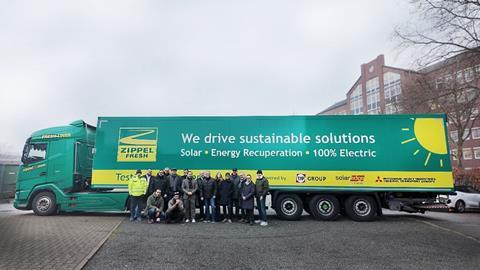
TIP Group, in collaboration with SolarEdge e-Mobility and Mitsubishi Heavy Industries Thermal Transport Europe, has launched the Powered Trailer, an electric refrigerated trailer powered by solar panels, an energy recuperation axle and a modular battery system.
Amsterdam-based rental giant TIP Group supplies the trailer, while SolarEdge e-Mobility provides the energy recuperation axle. The system is designed to operate independently from the truck, making it compatible with all truck models and brands.
“This collaboration brings together industry leaders to create a solution that not only reduces carbon emissions but also delivers exceptional cost savings,” said Rogier Laan, vice president sales and marketing at TIP Group. “By integrating multiple renewable energy sources, we empower our customers to focus on their core business while reducing fuel consumption and operational costs.”
The Powered Trailer is equipped with Mitsubishi’s TEF1500 electric refrigeration unit, replacing traditional the diesel engine. Modular battery packs, integrated into the trailer chassis, offer storage capacities ranging from 15kWh to 75kWh. These battery packs can be charged via solar panels, energy recuperation from the trailer’s e-axle or shore power by connecting to the main electricity supply when available.
The energy recuperation axle operates at 400V DC, providing 8kW of continuous power and up to 20kW of peak power. The combined system reduces the need for diesel fuel, offering a potential operational cost saving.
“Our customers increasingly seek solutions that not only enhance sustainability but also streamline their operations,” said Oliver Bange, vice president central region at TIP Group. “By integrating multiple renewable energy sources, we’re offering our customers a truly unique product that sets a new standard for efficiency and sustainability in transportation.”
The system is being piloted by German logistics firm Zippel Fresh for a 12-month period.
TIP Group has also introduced similar systems, including energy recuperation axle e-reefers with Thermo King and Carrier solutions and battery-only options. These variants have been operationally tested, and the pilot will assess the performance of the solar-powered configuration with energy recuperation axle for broader application
TIP Group estimates that the investment cost for the e-reefer system is typically offset after approximately 1,500 hours of annual operation due to savings in diesel fuel. Additional benefits include lower CO2 emissions and reduced noise levels, which may be advantageous for urban operations.
“This innovation not only addresses the growing demand for sustainable logistics but also positions companies as industry leaders in sustainability,” noted Pavel Gilman, senior director sales and marketing and project management at SolarEdge e-Mobility.
The broader trailer industry has also explored alternative energy solutions. SDC Trailers, a leading UK trailer manufacturer, developed a kinetic energy recovery system (KERS) semi-trailer prototype in 2016. While initial trials faced challenges due to usage patterns, SDC has reported that advancements in technology may revive interest in KERS trailers as a means to improve fuel efficiency.










